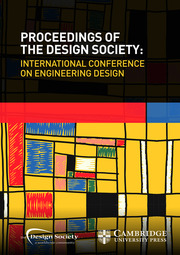Article contents
Exploring the Effect of Combinational Pictorial Stimuli on Creative Design Performance
Published online by Cambridge University Press: 26 July 2019
Abstract
Visual stimuli can be useful in supporting design ideation process. However, researchers still know very little about how stimuli should be delivered to designers during the early design stage. This question is crucial to the effective use of stimuli because previous researches have proved that ill-presented stimuli can have a negative impact on design creativity. Therefore, an empirical study was conducted with the aim of exploring if and how combinational pictorial stimuli can affect designers' creative performance. Results from a total of 36 participants show that the design outcomes presented by the group exposed to combinational pictorial stimuli were more creative than those given by the group exposed to no stimuli or randomly presented pictorial stimuli. These results imply that the form of stimuli delivery can affect creative design outcomes and combinational pictorial stimuli best support design creativity among these three conditions. These findings give us a better understanding of the roles that visual stimuli play in design, which is expected to bring us important implications for both design education and design support tool development
- Type
- Article
- Information
- Proceedings of the Design Society: International Conference on Engineering Design , Volume 1 , Issue 1 , July 2019 , pp. 1763 - 1772
- Creative Commons
- This is an Open Access article, distributed under the terms of the Creative Commons Attribution-NonCommercial-NoDerivatives licence (http://creativecommons.org/licenses/by-nc-nd/4.0/), which permits non-commercial re-use, distribution, and reproduction in any medium, provided the original work is unaltered and is properly cited. The written permission of Cambridge University Press must be obtained for commercial re-use or in order to create a derivative work.
- Copyright
- © The Author(s) 2019
References
- 1
- Cited by


